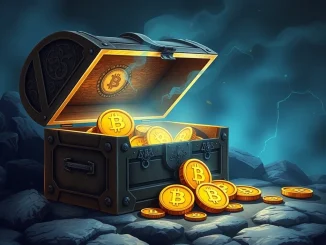
Get ready for a groundbreaking shift in the world of finance! Hong Kong, a global financial powerhouse, is making waves in the crypto sphere. Imagine gold, the age-old symbol of wealth, stepping into the digital age. That’s precisely what’s on the horizon as Hong Kong’s government seriously explores gold tokenization. This isn’t just about keeping up with trends; it’s a strategic move to integrate digital finance with the tangible real economy, and the implications are massive.
Why is Hong Kong Eyeing Gold Tokenization?
Hong Kong’s Financial Secretary, Paul Chan, dropped this exciting news at the Consensus conference, a major global crypto and Web3 event. Hosting this prestigious event outside the U.S. for the first time in five years underscores Hong Kong’s ambition to become a leading crypto hub. But why gold tokenization specifically? Let’s break it down:
- Modernizing Traditional Assets: Gold, while valuable, can be cumbersome to trade and store physically. Tokenization transforms gold into digital tokens on a blockchain, making it easier to buy, sell, and transfer.
- Boosting Financial Innovation: Hong Kong is keen to foster innovation in the digital finance space. Exploring gold tokenization signals a proactive approach to embracing new technologies and attracting crypto businesses.
- Enhancing Global Connectivity: Tokenized gold can facilitate faster and more efficient cross-border transactions, aligning with Hong Kong’s role as a global financial center.
- Diversifying Financial Products: Offering tokenized gold expands the range of digital assets available in Hong Kong, catering to a growing investor appetite for crypto and alternative investments.

Consensus Conference: A Stage for Hong Kong’s Crypto Ambitions
The Consensus conference, making its debut in Hong Kong, is a significant platform for this announcement. It brings together industry leaders, innovators, and policymakers, creating the perfect environment to showcase Hong Kong’s commitment to the crypto and Web3 space. Hosting this event demonstrates Hong Kong’s intent to:
- Attract Global Crypto Talent and Businesses: By hosting a major crypto event, Hong Kong is signaling its openness and welcoming stance towards the global crypto community.
- Showcase Regulatory Clarity: Hong Kong has been working towards establishing a clear regulatory framework for digital assets, and the Consensus conference provides an opportunity to highlight these efforts.
- Facilitate Dialogue and Collaboration: The conference fosters discussions and partnerships between traditional finance and the digital asset world, crucial for initiatives like gold tokenization to succeed.
Digital Finance and the Real Economy: Bridging the Gap
Paul Chan emphasized the importance of integrating digital finance with the real economy. Gold tokenization is a prime example of this integration. It’s not just about creating digital versions of assets; it’s about leveraging digital technologies to improve real-world financial processes. This includes:
| Aspect | Traditional Finance | Digital Finance with Gold Tokenization |
|---|---|---|
| Asset Transfer | Slow, complex, involving intermediaries | Faster, more efficient, peer-to-peer potential |
| Accessibility | Can be limited by geographical boundaries and high transaction costs | More accessible globally, potentially lower transaction costs |
| Transparency | Often opaque, limited traceability | Increased transparency through blockchain, enhanced traceability |
| Efficiency | Can be inefficient with multiple layers of bureaucracy | Streamlined processes, reduced bureaucracy |
Cross-Border Payments: A Key Driver for Tokenization
One of the most compelling use cases for gold tokenization is in cross-border payments. Traditional international payments can be slow, expensive, and involve multiple intermediaries. Tokenized gold offers a potential solution by:
- Reducing Transaction Costs: By eliminating intermediaries and leveraging blockchain technology, cross-border payments with tokenized gold can be significantly cheaper.
- Speeding Up Transactions: Blockchain-based transactions are typically faster than traditional banking systems, leading to quicker cross-border payments.
- Enhancing Security: Blockchain technology provides a secure and transparent platform for transactions, potentially reducing risks associated with international payments.
- Facilitating 24/7 Transactions: Unlike traditional banking hours, blockchain operates 24/7, enabling faster settlement for cross-border payments across different time zones.
Challenges and Considerations
While the potential of gold tokenization is immense, there are challenges to consider:
- Regulatory Framework: Clear and comprehensive regulations are crucial for the widespread adoption of gold tokenization. Hong Kong’s government will need to develop a robust regulatory framework to address investor protection, anti-money laundering, and other concerns.
- Security and Custody: Ensuring the secure storage and custody of tokenized gold is paramount. Robust security measures and reputable custodians are essential.
- Adoption and Education: Widespread adoption requires educating investors and market participants about the benefits and risks of gold tokenization.
- Interoperability: For seamless cross-border payments and wider use, interoperability between different gold tokenization platforms and blockchain networks is important.
Hong Kong’s Vision: A Glimpse into the Future
Hong Kong’s exploration of gold tokenization is a bold and forward-thinking move. It signals a clear intention to embrace digital innovation and solidify its position as a leading global financial center in the digital age. By integrating digital finance with the real economy, and specifically through initiatives like gold tokenization and facilitating efficient cross-border payments, Hong Kong is paving the way for a more efficient, accessible, and innovative financial future. The world will be watching closely as Hong Kong takes these exciting steps into the realm of digital assets.



